This article is co-published with FiveThirtyEight.
Introduction
Terry Wolfe has a dog, three cats and a deep desire to help elect members of Congress who will check President Donald Trump.
“I just cannot really tolerate that man,” he declared.
Wolfe is putting his money where his mouth is.
Since January 2017, Wolfe, a 68-year-old retiree in Morgantown, West Virginia, has contributed more than $14,000 to Democratic congressional candidates. (He also gave to a handful of left-aligned independents, such as Sen. Bernie Sanders.) Like millions of other Democratic donors, he’s been giving via ActBlue, a fundraising platform designed to allow grassroots donors to easily give to Democratic candidates. His average contribution? Less than $11.
Wolfe is one of the most active members of an army of grassroots donors shoveling a mountain of cash into the coffers of Democratic U.S. House and U.S. Senate candidates on the November ballot.
ActBlue, a nonprofit whose online fundraising tools have been used to varying degrees by nearly every Democrat running for Congress, says it has raised more than $2.9 billion for Democrats and progressive organizations since its founding in 2004. September was the biggest month in its history.
An analysis of campaign finance data by the Center for Public Integrity and FiveThirtyEight shows that ActBlue is handling more political contributions than ever before. Between January 2017 and Sept. 30, 2018 — the most recent date for which Federal Election Commission data is available — nearly $564 million, or about 55 percent of all contributions from individual donors to Democratic congressional candidates, passed through the platform, compared to about 19 percent at this point in the 2014 election.
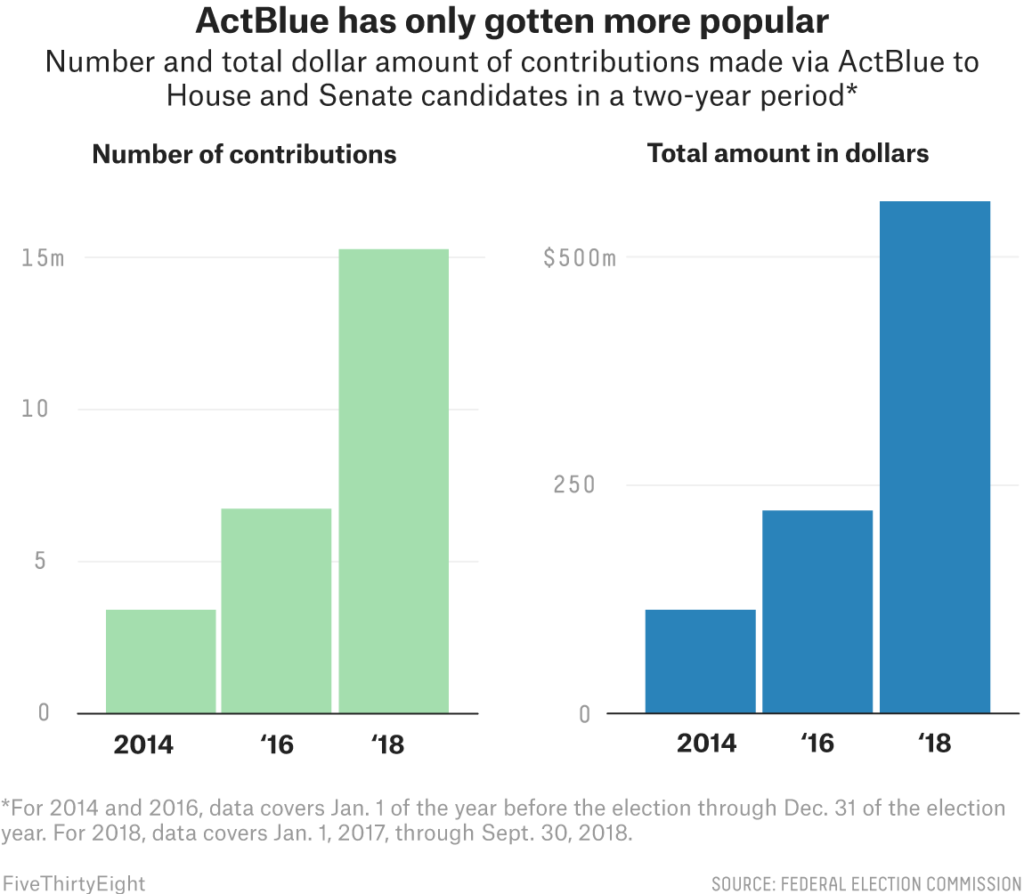
Democratic congressional candidates have collectively raised more than three times as much in small-dollar contributions (amounting to $200 or less) as they had at this point in 2014 — jumping from about $81 million to $276 million. Republicans haven’t matched that increase, and ActBlue is a big reason why.
To get a better sense of the role ActBlue is playing in the Democratic party, the Center for Public Integrity and FiveThirtyEight analyzed almost 38 million Federal Election Commission records of contributions to federal political committees that were sent through ActBlue since January 2017, along with the records of contributions made through ActBlue up to this point in the 2014 and 2016 elections. Donors are using the platform to reshape the map of competitive races, becoming a powerful force that could sway Democratic politics beyond November’s election.
Information about donors giving $200 or less is often hard to come by because campaigns aren’t required to publicly disclose those records if the money is given directly to the candidate’s campaign committee. But because ActBlue operates as a legal conduit — a federal political committee that passes contributions through to other committees — it does have to disclose the donors who give to federal political committees through its platform, regardless of the size of the contribution, which provides a window into the small-donor boom.
The Center for Public Integrity and FiveThirtyEight analysis of ActBlue’s filings since January 2017 found:
- Donors in California and New York combined to contribute roughly one-third of the dollars that have flowed through ActBlue to House and Senate candidates since the beginning of 2017. For comparison, those two states provided about one-fifth of the national popular vote for Democratic presidential nominee Hillary Clinton in 2016.
- Fifty-seven percent of dollars directed to congressional candidates via ActBlue went to out-of-state races. Take Rep. Beto O’Rourke, a Democrat who has set fundraising records while challenging Republican Sen. Ted Cruz in Texas. Most of the $45 million in individual contributions O’Rourke raised through ActBlue came from Texas donors — 52 percent. But even though less than half — 48 percent — came from outside Texas, O’Rourke is still the biggest beneficiary — among candidates appearing on the November ballot — in sheer dollars, of out-of-state cash routed through ActBlue because he’s raised so much in total.
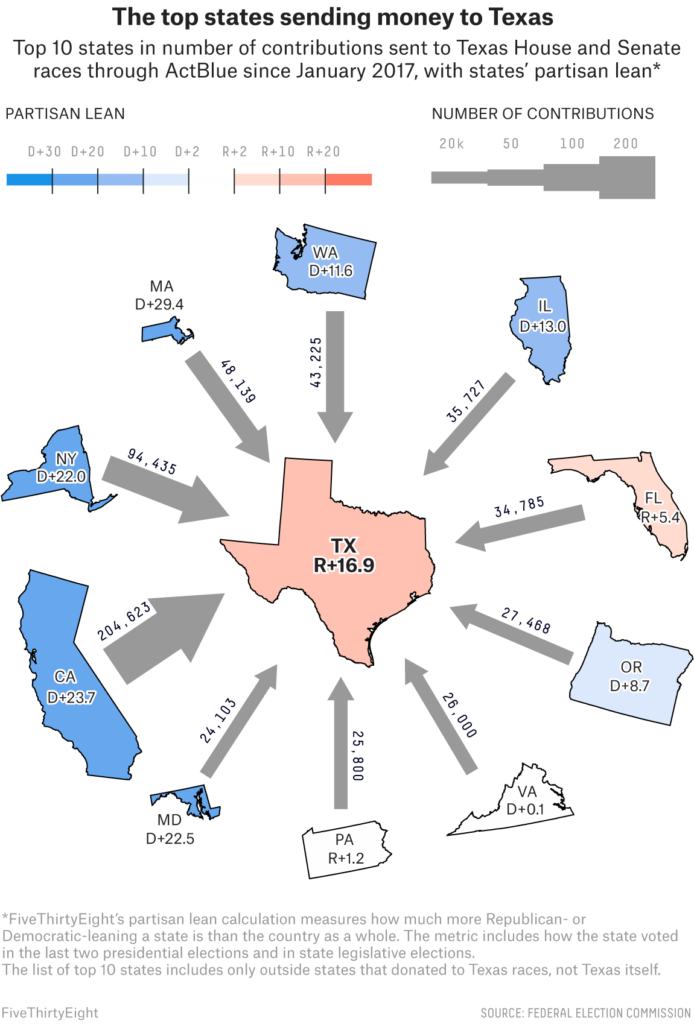
- Since the beginning of 2017, donors in states Clinton won have given $157 million to support House and Senate candidates running in states Trump won. That’s more than five times the amount of cash flowing from Trump states to Clinton states.
Erin Hill, ActBlue’s executive director, noted that the states sending the most money through the platform are, generally, also the states with the highest populations, so it makes sense that they are the source of so much cash. For example, donors from Texas, a red state and the second-largest in the nation by population, give the third-largest amount to Democratic congressional candidates via ActBlue — slightly more than 8 percent of all the money going to congressional candidates through the platform. A little more than half of that Texas cash comes from three large, blue cities: Houston, Austin and Dallas.
The analysis conducted by the Center for Public Integrity and FiveThirtyEight did find, however, that ActBlue donors across the country give more money in states that Clinton won by a higher margin. In states where Trump won, donors gave an average of $2.39 per vote cast in the 2016 presidential election via ActBlue, a little more than a third of the $6.35 per vote that Clinton states gave. But the states where Clinton won by a margin of less than 20 percentage points gave an average of $4.16 per vote, while places where Clinton won by a margin of 20 percentage points or more — six states plus the District of Columbia — gave an average of $8.64 per vote. In other words, the bluer the state, the more money came from it, regardless of size.
Who We Are
The Center for Public Integrity is an independent, investigative newsroom that exposes betrayals of the public trust by powerful interests.
It’s clear that what Republicans have taken to calling “the green wave” of cash to Democratic candidates is counteracting the large-donor advantage that Republican groups continue to boast over Democrats, with billionaires such as casino mogul Sheldon Adelson funding super PACs that then make ruthless decisions about which GOP candidates get a boost — and which candidates must fend for themselves.
Of course, candidates with the biggest fundraising haul don’t always win, though cash can still make or break campaigns and strong grassroots fundraising can indicate voter enthusiasm. Democrats are hoping the cash haul and donor growth reflect real momentum heading into next month’s midterm elections. The money could also allow Democratic candidates to outspend their Republican rivals, even those with support from cash-flush GOP super PACs, and force Republicans to actively defend more seats than they would have otherwise.
The surge in individual donations also sets the scene for the 2020 presidential campaign. “The pool of small-dollar donors keeps growing,” said Hill. How big that pool will get is still an open question.
ActBlue, founded in 2004 by two friends and based in Somerville, Massachusetts, is a fundraising tool that outlasts the mayfly-like lifespan of any single campaign by establishing relationships with donors that bridge the lull in enthusiasm between elections. Any Democratic candidate — ActBlue also works with some liberal-aligned independent candidates, such as Sens. Bernie Sanders and Angus King — or left-leaning organization can use its tools to raise money, but the organization itself doesn’t fundraise for any candidate, it just processes and forwards individual contributions. (ActBlue does give users the option of giving “tips” that go to ActBlue itself — these tips are the organization’s primary source of revenue.) Donors who save their credit card information online can make future contributions with a single click.
That has led to a swell of donations from Democrats who don’t have a vote in the races they’re contributing to.
Corbin Trent — a spokesman for Democratic congressional candidateAlexandria Ocasio-Cortez, a former Bernie Sanders presidential campaign staffer and one of the leaders of Justice Democrats — said what matters is whether candidates are authentic, not whether donors are local. A streak of losing elections means it’s time for Democrats to listen to the grassroots, he said.
“Instead of being a party that accepts grassroots enthusiasm, grassroots dollars, grassroots input, we’ve been one that sort of pushes against that, and the price is sort of control over our own destinies,” Trent said.
Rep. John Sarbanes, a Maryland Democrat who has long pushed for Congress to create a public financing program that would match contributions from small donors, said his proposal would require that contributions come from the candidate’s state in order to qualify for the initial match.
“You want to encourage them to reach out to folks who are closer to hand,” Sarbanes said, and a public financing system should “be anchored in promoting communication between the candidate and the people they’re going to end up serving.”
Sibylle Barlow’s outgoing voicemail message puts you on notice: “I do not promise to give to any organization over the phone.”
Most people hang up when they hear that, she said.It’s no wonder people are calling Barlow, 91, for money. So far this election cycle, she’s given money via ActBlue at least 4,800 times, the analysis of federal filings showed. (To track a single donor, the Center for Public Integrity and FiveThirtyEight matched contributions by name and ZIP code and also combined any contributions of identical amounts that took place on the same day as they may represent a single transaction that was divided among multiple candidates.) She gets at least 50 online appeals per day, she estimates, and said she tries to keep her contributions to $20 or less at a time — in part because she worries about triggering a fraud alert on her credit card.
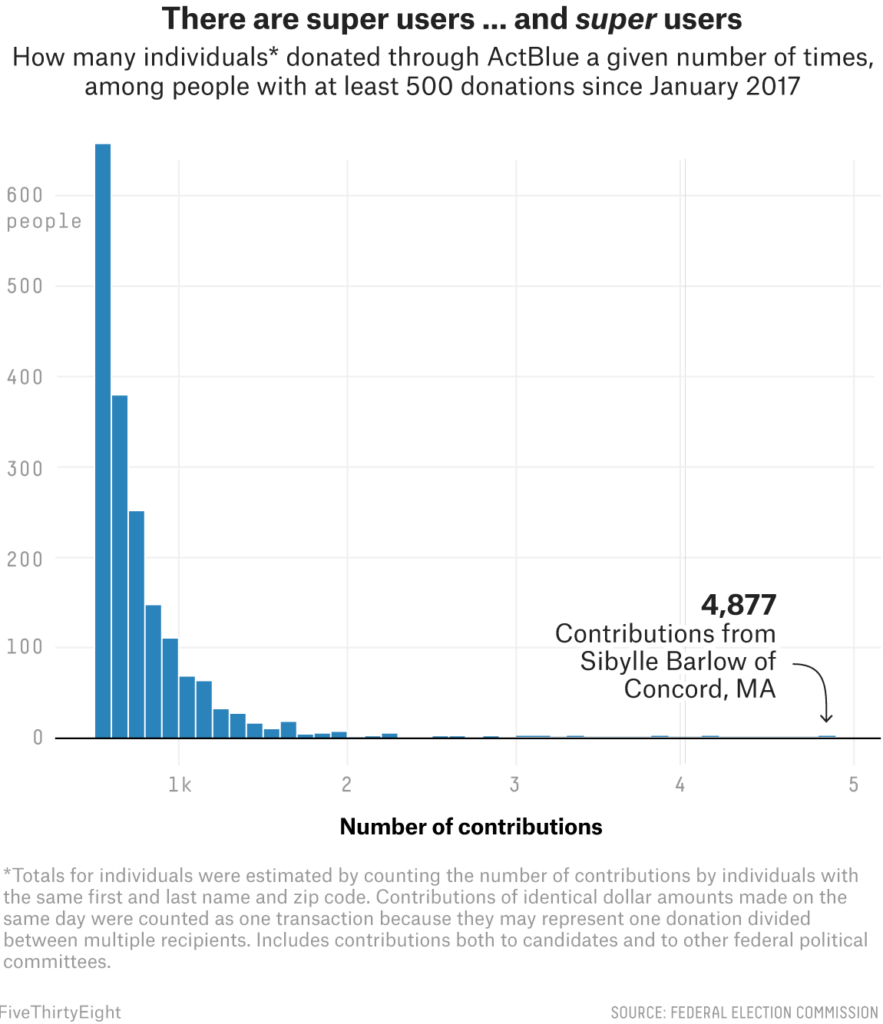
Barlow lives in Concord, Massachusetts, but nearly all of her contributions go out of state to recipients including Rep. Jacky Rosen, a Democrat running for a Nevada Senate seat, and Gina Ortiz Jones, a House candidate in Texas.
“Massachusetts is, I think, safer for Democrats,” she said, so she gives instead to places where a progressive candidate seems to need a boost. “I think it seems really important for the Democrats to win this time,” she said.
This election cycle, there are lots of Sibylle Barlows living in blue states and giving in varying amounts and at varying frequencies, looking to take action in hopes of putting a check on the president or boosting Democrats. Many of them have decided the best action they can take is giving, often in small amounts.
“I’m not a big-bucks contributor, but I did know what I could do is try to be as effective as possible by looking at races around the country,” said William Nottingham, 68, a retired newspaper editor who lives in Los Alamitos, California, and has given $7,600 since the beginning of 2017. Nottingham said he looked for races in the South and Midwest with “good candidates.”
“I can’t get in the car and drive to Kentucky and campaign for someone like Amy McGrath,” a high-profile Democratic challenger campaigning for a House seat, “but I can sure send her a couple of bucks now and then,” Nottingham said.
His thinking isn’t unique. An analysis of money McGrath has raised from people who gave more than $200 shows the largest amount came from Kentucky donors, but many of her smaller donors come from the coasts. An analysis of the $4.3 million in contributions made to her committee through ActBlue — which includes smaller contributions that aren’t in the FEC’s analysis — shows California at the top of the list in terms of both total dollars and the number of donations.
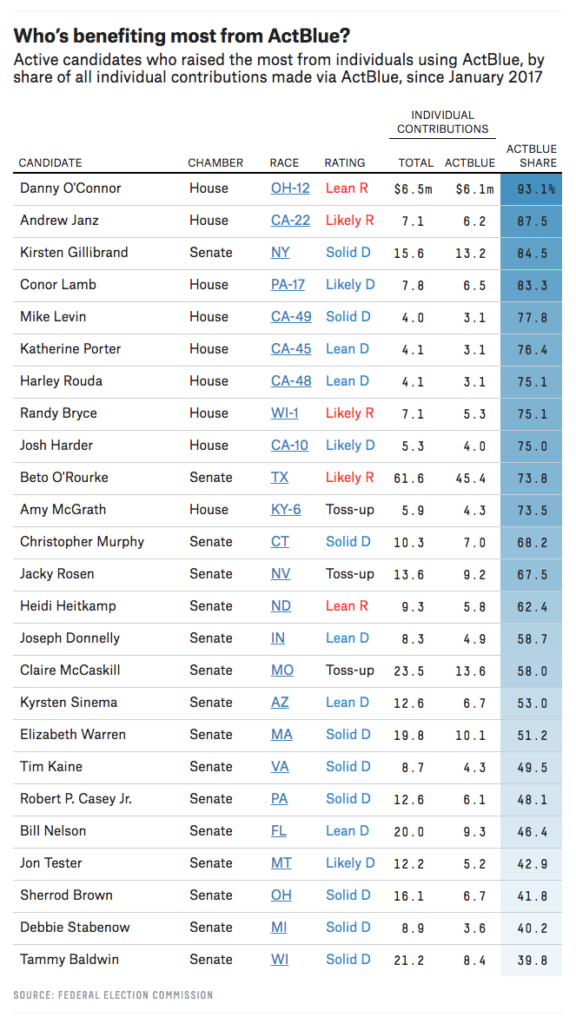
Meanwhile, ActBlue raises the classic chicken-and-egg question: Are Democratic candidates able to raise more money because ActBlue makes it easy, or are ActBlue’s tools simply equipping Democrats to better capture a surge of anti-Trump enthusiasm?
It’s impossible to know for sure — especially since conservatives have no single comparable fundraising platform for small-dollar donors. But many insiders are convinced that ActBlue has brought more donors to campaigns.
If ActBlue disappeared tomorrow, it would be “an absolute disaster for Democratic party fundraising,” said Tim Tagaris, a digital fundraising consultant who worked on Sen. Bernie Sanders’s presidential campaign and who said he’s been using ActBlue since 2004.
But ActBlue isn’t going away — it’s just getting bigger. And despite several Republican efforts to create an “ActRed” of sorts, no such system has taken flight.
“Obviously that’s an advantage” for Democrats, said Rebecca Donatelli, the president of the firm Campaign Solutions, who recalls raising money online for the GOP New York gubernatorial candidate George Pataki in 1998. “I wish we had something a little more seamless like that, but we don’t.”
The fact that any Democrat can use ActBlue’s infrastructure also makes it easier for outsider candidates to generate money without support from party gatekeepers, said Michael Malbin, a political science professor and executive director of the nonpartisan Campaign Finance Institute. “As long as you’re a Democrat, they’re not running ideological litmus tests,” he said of ActBlue.
The lure of online fundraising forces candidates to pay close attention to the policy priorities of the base, said Tim Lim, a consultant who has worked on digital advertising for Democratic presidential and congressional campaigns.
The downside: Some candidates catch fire, some don’t, and there is no real way to ensure that resources go to the most competitive races.
“It’s a mixed bag. We’ll see how we do this cycle,” Lim said.
For example, earlier this month, Andrew Janz, a California Democrat challenging Republican Rep. Devin Nunes for a House seat, touted the $4.3 million he raked in during the third quarter. “That’s quite a lot for a Solid R race,” tweeted Dave Wasserman, a FiveThirtyEight contributor and the House editor for the nonpartisan Cook Political Report.
FiveThirtyEight recently gave Janz a 5 percent chance of winning the seat as of 11:45 a.m. Thursday, but his campaign has nonetheless ranked among the top recipients of dollars given to House candidates through ActBlue this election cycle. That could be because Nunes, the chairman of the House Intelligence Committee, is a high-profile Trump ally — and a tempting target for angry grassroots Democratic donors, even if their money isn’t likely to bring him down.
Even Democrats have been shocked at the totals that some of the party’s candidates have been raking in. Earlier this month, McGrath’s campaign in Kentucky said she had raised $3.65 million during this year’s third quarter. A little more than $2 million came through ActBlue.
Alixandria Lapp, head of House Majority PAC, a super PAC working to ensure Democrats take control of the House, sounded a note of incredulity on Twitter. “How do you even spend that much money in KY-06?? Wow!” she wrote.
To be sure, Democrats continue to have their share of super PACs and billionaire benefactors (check under, for example: Bloomberg, Michael and Steyer, Tom). But Trent said the grassroots fundraising this cycle is showing candidates that there are alternatives to soliciting contributions from corporate PACs and big donors.
Hill, the ActBlue director, credits grassroots donor activity for pushing Democrats to prioritize special elections around the country last year, even though Democratic candidates weren’t always favored to win.
“The grassroots donors were there before other donors were there, before institutional donors were there, saying, ‘We want to contest these races,’” she said.
Wolfe, the West Virginia donor, doesn’t himself live in a competitive congressional district.
He has given about $230 — spread across nearly a hundred contributions — to Richard Ojeda, a Democrat running for an open House seat in a neighboring district rated as “likely Republican” by FiveThirtyEight.
Wolfe says he about fell over when Ojeda took the time to call him not once, but three times.
“He just wanted to say about how he was interested in representing the common man,” Wolfe said. Ojeda told Wolfe he wasn’t taking corporate dollars, something Wolfe liked. “For him to take his time on small donations to thank me — to me, that is a man of character,” Wolfe said.
Madalin Sammons, the Ojeda campaign’s communications director, confirmed that the candidate spends a few hours every week calling donors who give less than $100 — a sign of the importance the campaign places on such small contributions.
“It’s really hard for us to call everyone — we have a lot of small donors,” she said. “We try once a week to have him call anywhere between 25 and 100 people and thank them.”
Read more in Money and Democracy
Elections
Pop-up PACs are spending big in Election 2018’s final days — but they’re hiding their bankrollers
Beto O’Rourke and Jon Tester among ‘dark money’ beneficiaries
Money and Democracy
A Donald Trump appointee — also a Saudi government lobbyist — is reassessing his roles
Richard F. Hohlt is considering retirement
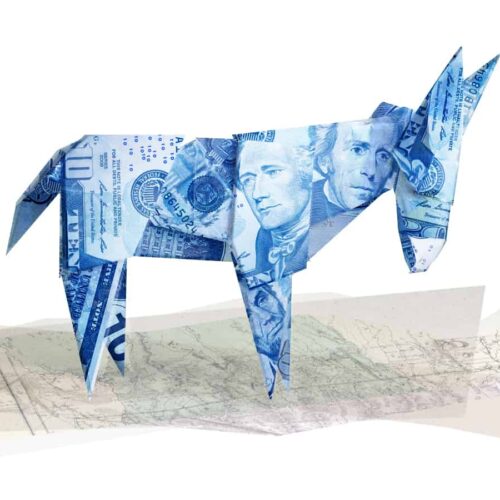
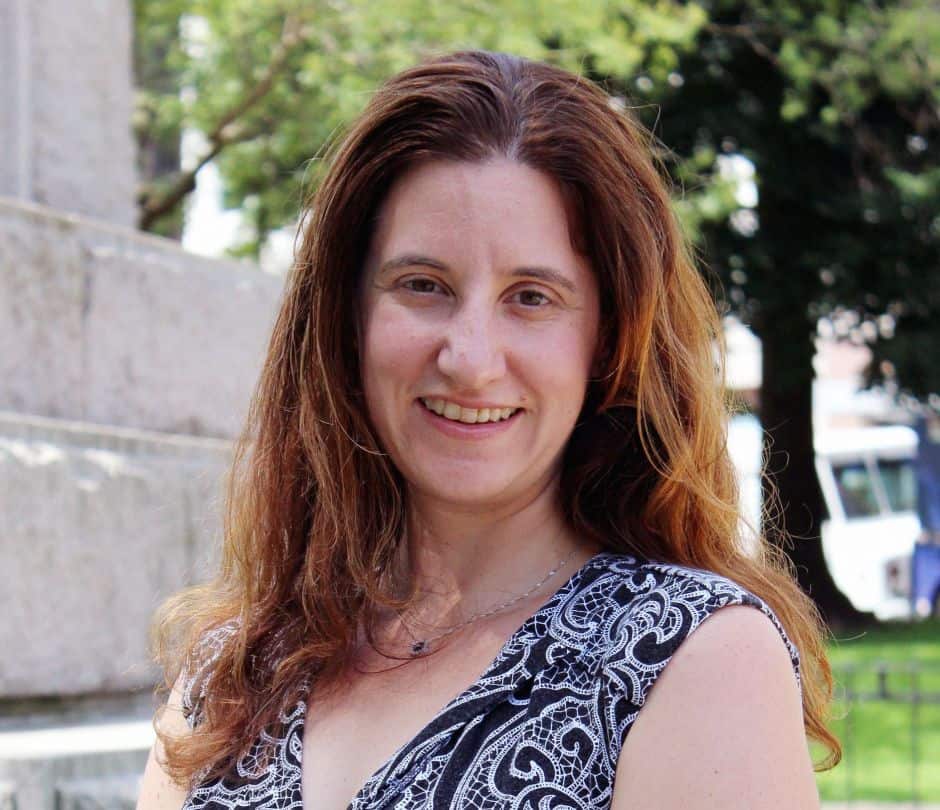

Join the conversation
Show Comments